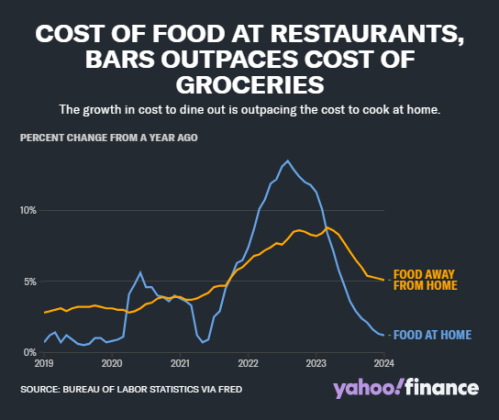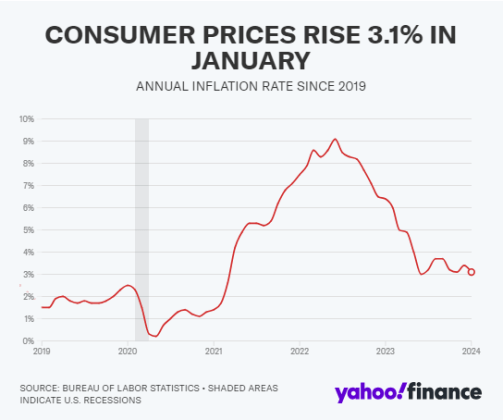ARTICLE AD
Inflationary pressures in the United States are poised to hit crypto-friendly fast food chains, potentially leading to a downturn in their fortunes. Recent data from the Bureau of Labor Statistics indicates a surge in inflation, resulting in challenges related to raw materials and the labor market. As the cost of essential ingredients rises, fast food establishments may experience lower profits, a decrease in customer footfall, and higher labor costs.
Dining Dilemma: Cost Of Eating Out Soars
According to a report by Yahoo Finance, Americans are becoming increasingly hesitant to accept invitations for elegant dining experiences outside their homes. In January alone, the cost of eating out rose by 5.1% compared to the same month last year and by 0.5% from the previous month. Conversely, grocery prices witnessed a more modest increase of 1.2% over the previous year and 0.4% over December, stabilizing thereafter.
In the past, according to Citi analyst Jon Tower, a pattern has emerged where, if commodity inflation outpaces labor inflation, grocery prices tend to rise faster than those at restaurants. Conversely, when labor inflation exceeds commodity inflation, restaurant prices tend to surpass those of groceries.

This trend suggests that consumers may opt to cook at home more frequently as the cost of dining out continues to rise. Additionally, the higher cost of living translates into increased prices for raw materials, posing profitability challenges for fast food chains.
Several crypto-friendly fast food chains are already facing the impact of soaring inflation. KFC, renowned for selling the “Bitcoin Bucket,” encountered difficulties as poultry prices reached an all-time high last year.
Similarly, Starbucks, which enables customers to pay with Bitcoin, faced a more than 40% increase in commodity prices for Arabica coffee since the onset of the pandemic. Subway, one of the pioneers in accepting Bitcoin as payment, has grappled with the rising costs of essential vegetables, bread, and other raw materials.
In addition to the escalating costs of raw materials, fast food chains operating at least 60 sites across America will soon face the necessity of increasing the minimum wage for their restaurant employees to $20 per hour. This impending change, set to take effect in April, is likely to exacerbate challenges related to profitability and cash flow.

Crypto Payments Dwindle Amid Inflation Concerns
The impact of rising inflation extends beyond the fast food industry to the realm of crypto transactions. As restaurants struggle to maintain their foothold in the market, many customers may opt to avoid using cryptocurrencies as payment.
Conducting crypto transactions on various platforms incurs fees, and with purchasing power already under strain, customers may seek to minimize additional expenses and instead prefer cash or card payments.
Featured image from , chart from TradingView

 9 months ago
39
9 months ago
39 

